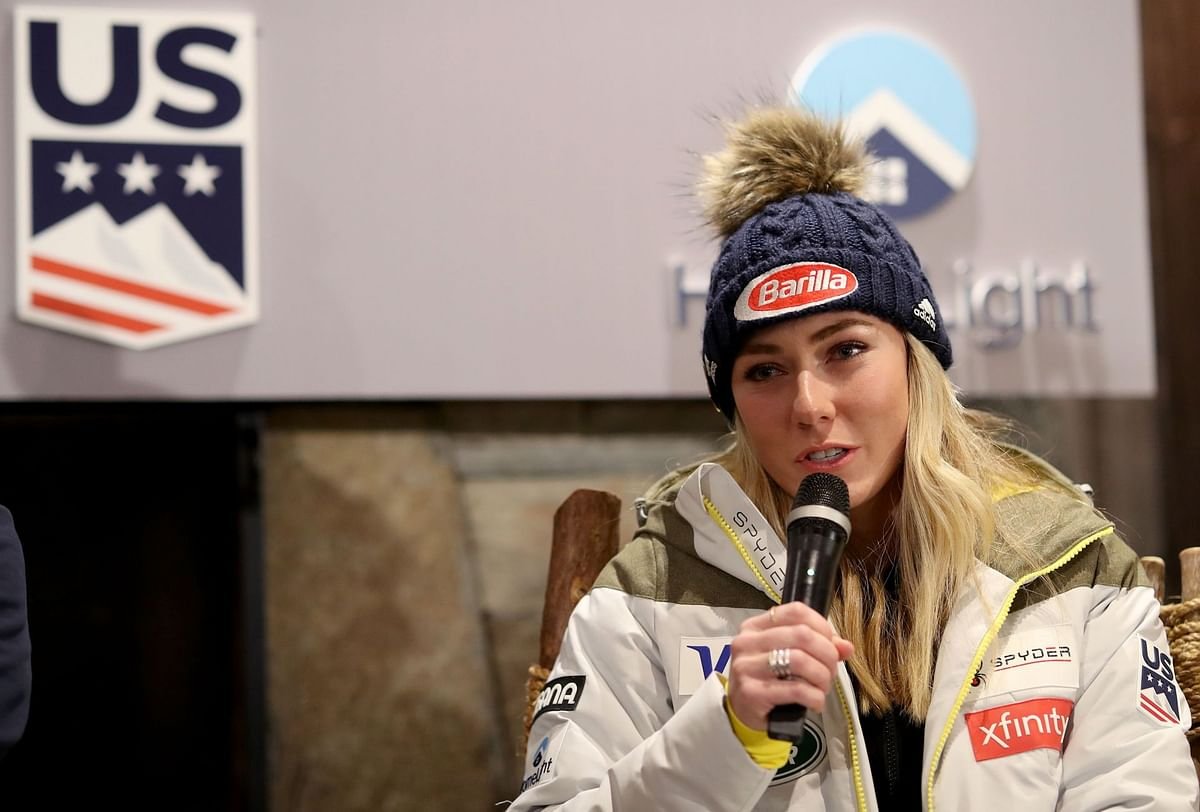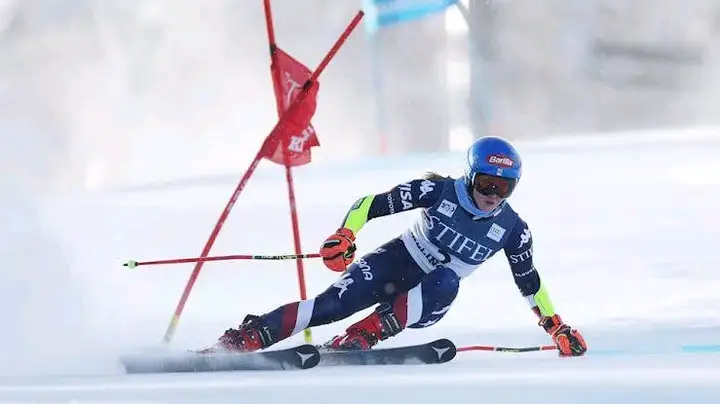Mikaela Shiffrin’s mother, Eileen, recently sent a heartfelt letter as her daughter and skier made her debut on The Voice. Shiffrin appeared in the final round of The Voice season 27.
She made her season 27 debut on The Voice after extended her Alpine Skiing World Cup victory streak to 101 in Sun Valley, Idaho. She accomplished the mark only weeks after winning her 100th title in Sestriere, Italy. Shiffrin led the race by 1.13 seconds over German Lena Dürr.
Following her victory, she uploaded a video of herself singing Anna Nalick’s Breathe, building excitement among supporters. A few days later, Shiffrin was joined by her mother on The Voice’s season finale. Her mother also provided a few peeks of their participation at the performance, including the skier practicing her song in her hotel room.
“Miki and I had so much fun and laughs with @michaelbuble, @kelseaballerini (The Voice coaches), and the entire “The Voice” crew in Burbank last week. Absolutely hilarious. What an awesome “office” 👊🥳. “Miki crushed her song after a brief hotel room warm-up,” Eileen wrote. “It was hard to beat that day. “Thanks, NBC!🙏”
NBC!🙏”
Janhavi is a Sports Management graduate working as a US Olympics journalist at Sportskeeda. She emphasizes meticulous research and fact-checking before creating content, relying on multiple sources including social media platforms like Instagram and Twitter, as well as various sports publications.
She has competed in the 10m Air Rifle Shooting event at the national level alongside renowned athletes such as Anjali Bhagwat, Apurvi Chandela, and Anjum Moudgil, which further fueled her passion for the sport.
Abhinav Bindra is her favorite Olympian, and she particularly cherishes his and Neeraj Chopra’s gold medal victories as they revolutionized Indian athletes’ mindset towards achieving sporting excellence.
If given the opportunity to introduce a new sport to the Olympics, she would choose American Football for its widespread appeal and intense competition. Apart from reporting on the latest news in the world of Olympics, she likes to immerse herself in reading, painting, and traveling. NBC!🙏”

Mikaela Shiffrin reacts to Michael Bublé’s second consecutive victory as The Voice coach in the Killington Cup in Vermont. (Photo via Getty Images.) Mikaela Shiffrin competes at the Killington Cup in Vermont. (Photo via Getty Images.)
Mikaela Shiffrin congratulated musician Michael Bublé on winning The Voice for the second time in a row while the skier was there. when making his debut in season 26 in 2024, Bublé returned for season 27 and won the title as coach when Adam David was declared the winner. Bublé shared some highlights from the evening and expressed his delight at being a part of the program.
In one of the photos, he can be seen posing with Shiffrin as she is wearing her Olympic medals.
“I’m still catching my breath after last night’s finale.” This season of The Voice was something I’ll never forget. Thank you to my great staff for putting your trust in me.”
He added:
“And to Adam, our winner—what an honour to walk this road with you, man. You are the real deal, and I am really proud of you. I am forever grateful. ❤️”
Shiffrin responded to Bublé’s tweet with applauding emojis in the comments.
A screenshot of the Instagram post’s comments area. A screenshot of the Instagram post’s comments area.
Mikaela Shiffrin has won three Olympic gold medals, including gold in 2014 and gold and silver in 2018.
Was this article helpful?
Mikaela Shiffrin Issues a Serious Warning Regarding Alpine Ski Racing’s Future.

Alpine ski racing stands at a crossroads. Recent remarks by Mikaela Shiffrin—widely regarded as the most decorated alpine skier in history—have sounded the alarm that the sport’s very future may be imperiled if decisive action isn’t taken. As climate change disrupts snowfall patterns and rising temperatures force race cancellations and course alterations, Shiffrin has called on athletes, organizers, and governing bodies to confront the environmental threats undermining the foundations of competitive skiing.
Shiffrin’s platform lends extraordinary weight to her warning. With an unprecedented 101 World Cup victories—including wins across all six alpine disciplines—she has redefined the sport’s record books and captured global attention both on and off the slopes. Her consistency, technical mastery, and unflagging drive have made her not just a champion but an ambassador for ski racing worldwide. When she speaks about the sport’s future, stakeholders listen.
In an interview with NBC Sports’ “On Her Turf,” Shiffrin painted a stark picture of the changing conditions at World Cup venues. “Alpine skiing depends on snow and consistent weather conditions,” she observed. “And we’re not really getting that anymore. It’s like the environment telling us it is super temperamental and angry. And that we’ve done something very wrong.” Her words resonate as athletes face more frequent event cancellations and compressed competition calendars due to unseasonal warmth and unpredictable snowfall.
Scientific data underscores Shiffrin’s concerns. Studies show that average winter temperatures in many traditional ski regions have increased by more than 2°C over the past five decades, reducing natural snow cover and shortening seasons. Glaciers that once hosted early-season races in Soelden and Zermatt are retreating at alarming rates, threatening the viability of alpine skiing’s iconic opener on the Rettenbach Glacier. Without adaptation, key races may vanish or relocate, undermining the sport’s heritage and economic engine.
Athlete-led activism has begun to shift the conversation from performance to preservation. In 2023, Shiffrin joined nearly 200 athletes—including Federica Brignone and Aleksander Aamodt Kilde—in signing an open letter to the International Ski and Snowboard Federation (FIS). The letter demanded transparency on carbon footprints, credible sustainability strategies, and a reshaped World Cup calendar to reduce travel emissions. Its signatories argued that a season spanning continents twice over, as currently scheduled, was no longer tenable.
The FIS has acknowledged these demands but maintains that logistical realities and regional weather patterns limit its flexibility. In response to the petition, the federation pointed to incremental sustainability measures—carbon offsets, hybrid race fleets, and selective event relocation—but stopped short of overhauling its traditional October-to-March season window or dramatically reducing long-haul travel. Critics argue that these steps, while welcome, fall short of the systemic change athletes like Shiffrin deem necessary for the sport’s long-term survival.
Race organizers are also grappling with the costs and feasibility of artificial snowmaking and venue infrastructure upgrades. High-capacity snow guns require vast amounts of water and energy, raising questions about their environmental and financial sustainability. Indoor ski centers, once niche attractions, may offer a controlled alternative, but their construction demands significant investment and carries a hefty carbon footprint. As a result, smaller resorts and local economies that rely on natural snow face existential threats if temperatures continue to climb.
Shiffrin has even called for personal adjustments to her own World Cup schedule, hinting at a shift in early-season planning to align with more reliable snow conditions. “I’m very close to changing my early season schedule to account for the climate impact of all the travel,” she said, illustrating how athletes may need to adapt training and racing choices in response to environmental realities. Such individual decisions, while symbolic, underscore the demand for collective, sport-wide strategies.
Looking ahead, technology and innovation may offer partial relief. Advances in zero-emission snowmaking, renewable energy–powered lifts, and eco-friendly resort design could mitigate some impacts. Event planners are exploring geographically consolidated race clusters to reduce air travel, while FIS has discussed a rotating “climate calendar” that shifts venues in real-time based on alpine weather forecasts. Whether these measures can preserve ski racing’s global footprint remains an open question.
Experts warn that incremental improvements are unlikely to suffice without bold leadership. “There’s a very real threat to what we know and love from winter,” noted Shiffrin in a separate statement captured by Phys.org. “We hope to enjoy skiing and winter recreation for many, many years to come—and that’s under threat right now.” The clock is ticking on both natural snowfields and institutional willpower to enact transformative change.
Mikaela Shiffrin’s impassioned warning echoes far beyond the race course. It challenges every stakeholder—from athletes and coaches to sponsors, broadcasters, and governing bodies—to champion sustainability with the same intensity they bring to competition. As alpine ski racing confronts a future defined by climate uncertainty, Shiffrin’s voice may prove pivotal in steering the sport toward a more resilient and responsible era. Failure to heed this warning risks losing not just races, but the very essence of winter’s most exhilarating spectacle.


















